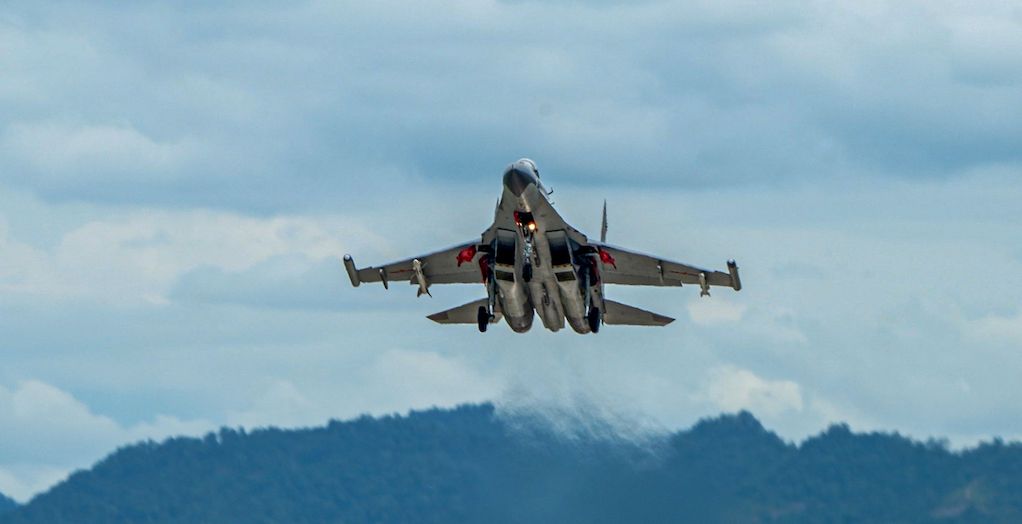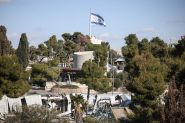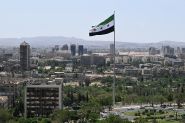- Home
- Middle East
- End of Chinese Military Intimidation Drills Around Taiwan

©Chinese fighter jet taking off during the "Joint Sword-2024A" military drill at an unknown location. (Photo by EASTERN THEATER COMMAND OF THE PEOPLE'S LIBERATION ARMY / AFP)
China puts an end to the military exercises around Taiwan, which began on Thursday morning in reaction to the election of pro-independence president Lai Ching-te.
China has ended two days of military drills around Taiwan that saw jets loaded with live munitions and warships practice seizing and isolating the self-ruled island.
The exercises simulated strikes targeting Taiwan's leaders as well as its ports and airports to "cut off the island's 'blood vessels'," Chinese military analysts told state media.
Beijing considers the democratic island part of its territory and has not ruled out using force to bring it under its control.
The war games kicked off Thursday morning, as aircraft and naval vessels surrounded Taiwan to conduct mock attacks against "important targets," state broadcaster CCTV said.
Codenamed "Joint Sword-2024A," the exercises were launched three days after Taiwan's new President Lai Ching-te took office and made an inauguration speech that China denounced as a "confession of independence."
Beijing's defense ministry spokesman, Wu Qian, said on Friday that Lai was pushing Taiwan "into a perilous situation of war and danger."
"Every time 'Taiwan independence' provokes us, we will push our countermeasures one step further, until the complete reunification of the motherland is achieved," he said.
The drills are part of an escalating campaign of intimidation by China that has seen it carry out a series of large-scale military exercises around Taiwan in recent years.
On Saturday, Taiwan's presidency said the public could be assured it had "a full grasp of the situation and appropriate responses to ensure national security."
A total of 111 Chinese aircraft and dozens of naval vessels took part in the drills over two days, according to Taiwan's defense ministry.
Meng Xiangqing, a professor from Beijing-based National Defense University, told state news agency Xinhua that People's Liberation Army vessels "were getting closer to the island than ever before."
The drills took place in the Taiwan Strait and to the north, south, and east of the island, as well as in areas around the Taipei-administered islands of Kinmen, Matsu, Wuqiu, and Dongyin.
Tong Zhen, an expert from the Academy of Military Sciences, told Xinhua the drills "mainly targeted the ringleaders and political center of 'Taiwan independence', and involved simulated precision strikes on key political and military targets."
The United Nations called for all sides to avoid escalation.
The United States, Taiwan's strongest partner and military backer, on Thursday "strongly" urged China to act with restraint.
The Pentagon announced on Friday that Defense Secretary Lloyd Austin would meet his Chinese counterpart Dong Jun at the end of the month at the Shangri-La Dialogue, an annual gathering of defense officials from around the world.
"'Taiwan independence' separatists have long considered the island's eastern direction to be their backyard and 'shelter', but the drills have shown that we can control that eastern area," Meng told Xinhua, a Chinese military analyst.
With AFP
China has ended two days of military drills around Taiwan that saw jets loaded with live munitions and warships practice seizing and isolating the self-ruled island.
The exercises simulated strikes targeting Taiwan's leaders as well as its ports and airports to "cut off the island's 'blood vessels'," Chinese military analysts told state media.
Beijing considers the democratic island part of its territory and has not ruled out using force to bring it under its control.
The war games kicked off Thursday morning, as aircraft and naval vessels surrounded Taiwan to conduct mock attacks against "important targets," state broadcaster CCTV said.
Codenamed "Joint Sword-2024A," the exercises were launched three days after Taiwan's new President Lai Ching-te took office and made an inauguration speech that China denounced as a "confession of independence."
Beijing's defense ministry spokesman, Wu Qian, said on Friday that Lai was pushing Taiwan "into a perilous situation of war and danger."
"Every time 'Taiwan independence' provokes us, we will push our countermeasures one step further, until the complete reunification of the motherland is achieved," he said.
The drills are part of an escalating campaign of intimidation by China that has seen it carry out a series of large-scale military exercises around Taiwan in recent years.
On Saturday, Taiwan's presidency said the public could be assured it had "a full grasp of the situation and appropriate responses to ensure national security."
'Closer than Ever'
A total of 111 Chinese aircraft and dozens of naval vessels took part in the drills over two days, according to Taiwan's defense ministry.
Meng Xiangqing, a professor from Beijing-based National Defense University, told state news agency Xinhua that People's Liberation Army vessels "were getting closer to the island than ever before."
The drills took place in the Taiwan Strait and to the north, south, and east of the island, as well as in areas around the Taipei-administered islands of Kinmen, Matsu, Wuqiu, and Dongyin.
Tong Zhen, an expert from the Academy of Military Sciences, told Xinhua the drills "mainly targeted the ringleaders and political center of 'Taiwan independence', and involved simulated precision strikes on key political and military targets."
Calls to Avoid Escalation
The United Nations called for all sides to avoid escalation.
The United States, Taiwan's strongest partner and military backer, on Thursday "strongly" urged China to act with restraint.
The Pentagon announced on Friday that Defense Secretary Lloyd Austin would meet his Chinese counterpart Dong Jun at the end of the month at the Shangri-La Dialogue, an annual gathering of defense officials from around the world.
"'Taiwan independence' separatists have long considered the island's eastern direction to be their backyard and 'shelter', but the drills have shown that we can control that eastern area," Meng told Xinhua, a Chinese military analyst.
With AFP
Read more



Comments